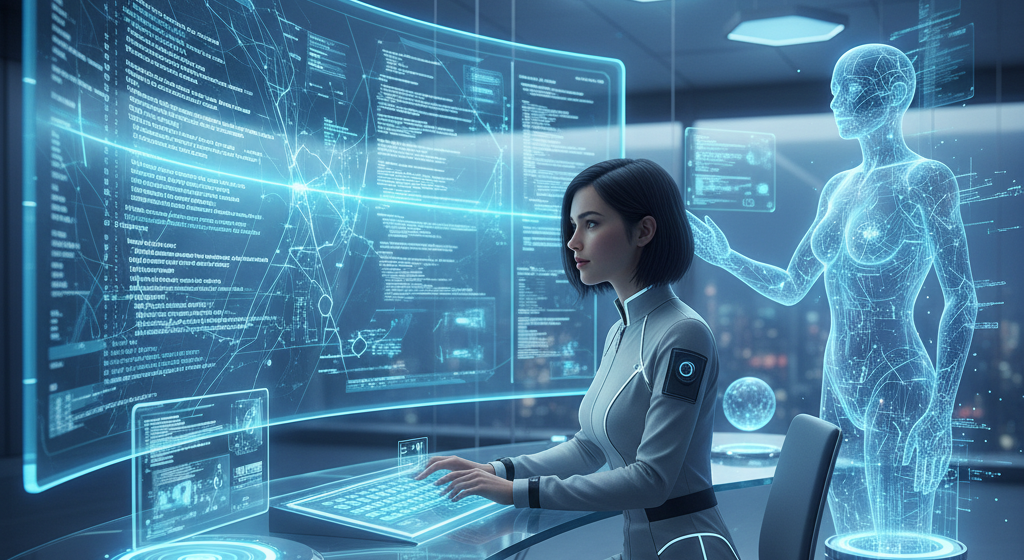There’s a quiet unease rippling through the developer community—a fear that artificial intelligence might soon make programmers obsolete. After all, when AI can generate functions, detect bugs, and even explain code in seconds, what’s left for the human coder to do? But that question misses the mark. The rise of AI in software development isn’t about replacement; it’s about amplification. What we’re witnessing is the birth of the AI-augmented developer—a coder whose creativity and productivity are multiplied, not diminished, by intelligent tools.
Let’s be clear: AI isn’t a rival sitting in your chair. It’s a silent partner hovering over your IDE, quietly anticipating what you’ll type next, spotting flaws you might overlook, and bridging gaps that once took weeks to cross. If anything, it’s the most tireless, precise, and fast-learning teammate you’ve ever had.
1. AI as the Ultimate Autocomplete
Remember when autocomplete was just a convenience—suggesting variable names or closing brackets? Now it’s evolved into a full-fledged collaborator. Tools like GitHub Copilot, Amazon CodeWhisperer, and Tabnine have transformed coding from a purely manual task into a semi-automated creative process.
These AI systems don’t just complete your thoughts; they predict your intent. Need a REST API endpoint? A simple comment can generate the function stub, error handling, and documentation in seconds. It’s like having an assistant who already knows your coding style, preferred frameworks, and architecture patterns.
This doesn’t make human programmers redundant—it makes them more strategic. When the boilerplate and repetitive syntax melt away, developers can focus on the logic, design, and user impact of their code. It’s not that AI writes the code for you; it writes with you. And that distinction makes all the difference.
2. AI as a Relentless Debugger
Ask any seasoned engineer what eats up their time, and you’ll rarely hear “writing new features.” It’s the debugging—the endless chase for that one errant semicolon, misconfigured API call, or memory leak that’s causing havoc.
Enter AI. Modern debugging assistants can analyze millions of lines of code faster than any human ever could. They detect patterns, infer intent, and even recommend fixes. Tools like DeepCode, Snyk, and Microsoft’s IntelliCode aren’t just finding bugs—they’re learning from every one they fix.
AI doesn’t get tired, frustrated, or tunnel-visioned after hours of testing. It examines edge cases humans might ignore and surfaces anomalies that don’t fit normal behavior. In that sense, it’s the perfect debugging partner—one that never sleeps and always pays attention.
For developers, this means less firefighting and more innovation. Instead of spending hours patching code, they can spend that time improving system design or refining user experience. The result: cleaner code, faster delivery, and fewer production nightmares.
3. AI as a Universal Translator
Every developer knows the pain of diving into legacy systems—a maze of outdated logic, undocumented functions, and cryptic variable names. It’s like deciphering an ancient language written by a past civilization of programmers.
AI is changing that too. With models trained on vast codebases across countless languages and frameworks, AI can now act as a universal translator. It can refactor COBOL into Python, explain what an old C++ function does, or even convert pseudocode into working JavaScript.
This isn’t just a convenience—it’s a bridge across generations of technology. Organizations can finally modernize systems without rewriting everything from scratch. And for developers, it means the barrier to learning new languages or working across stacks is dramatically lower.
The Shift: From Syntax to Strategy
So, is AI a tool, a teammate, or a threat? The answer lies in how we choose to use it. Those who treat AI as a mere utility will miss its transformative potential. Those who fear it will likely be left behind. But those who embrace it as a partner—a co-creator—will redefine what it means to be a developer in the 21st century.
The true value of human programmers won’t lie in how quickly they can write syntax, but in how deeply they can think. AI can generate functions, but it can’t yet define purpose. It can optimize algorithms, but it can’t imagine products that change lives. The future belongs to developers who can ask the right questions, architect elegant solutions, and understand why the code matters—not just how it works.
In short, the AI-augmented developer isn’t coding less—they’re thinking more. And that might just be the most exciting evolution in programming yet.

